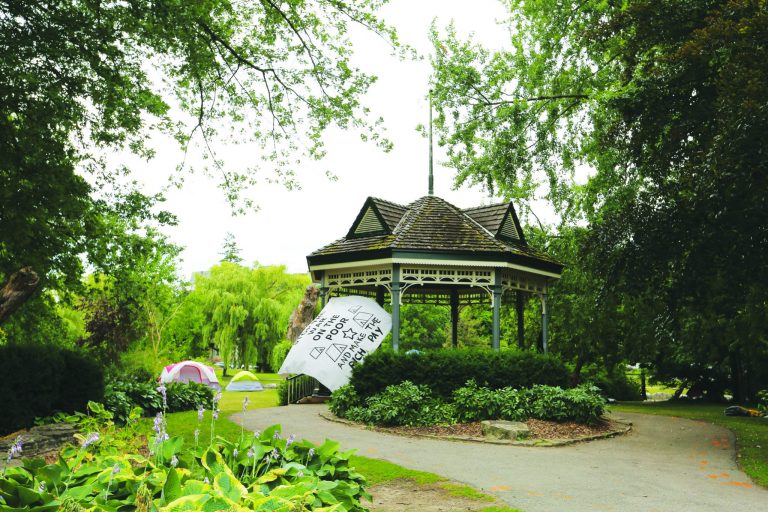Growing up in Kitchener, I didn’t think housing insecurity was a very big problem. I assumed government or community programs kept people on their feet until they found housing again. Or maybe, I had just assumed it would never happen to me.
It was devastating to learn that that the supports were not enough and that people in our community regularly die from sleeping rough.
I’ve been looking for ways to support people when they’re experiencing housing insecuirity, and the group of community members who set up the tent city in Willow River Park gave me a great opportunity to do so.
I showed up to the demonstration on July 1 and I’ve been volunteering there regularly since.
When I showed up, they were painting banners and setting up tents. One of the volunteers said the encampment has existed for years; the city just moved them in previous years and now they’re back.
There are very few people in our Waterloo Region community as committed to supporting homeless folks as the organizers of the Willow River Park Tent City. They supervise the tent city around the clock and provide tents, food and other supplies, often paid for out of their own pockets. I’ve heard of radical kindness, but I hadn’t seen it put into practice until I met the organizers of this tent city.
As well as providing everything that people on the island need, the organizers are negotiating with the city, trying their best to keep things looking acceptable and not too disruptive for tent city’s housed neighbours.
In the first few days, I mostly helped out by just picking supplies up from the store, little things that people on the island in the park needed. The organizers were doing their best, but their numbers were small. They were often low on food and drinking water, and sometimes ran out of little things like tape to fix up tents. My job was to hand out flyers to passers-by explaining the purpose of the tent city.
The number of residents grew from around a dozen in the first few days, and grew at a faster rate than in past years. Soon, I was asked to start taking shifts supervising the island.
Usually, supervising would take more training, but the organizers were ready to support me in situations that I might not know how to deal with. Some folks who are staying on the island keep to themselves more, but the outgoing folks at the tent city are friendly with me and usually with each other as well.
We check in with each other and share jokes and stories. Folks make pots of coffee to share and help each-other find things they need or put up each-others tents and tarps. They give each-other cigarettes. Some people, when offered a free cigarette, will insist on paying for it.
Most passers-by are kind or even vocally supportive, but on my third day supervising, a couple passing by got into an argument with some homeless youth. The couple were wishing ill on the youth and everyone staying in the tent city, admonishing me and the other organizers for enabling the residents’ “lack of work.” They threatened to come back with a group and burn the tents to the ground. The couple left and called the police. I had never spoken with police responding to a call before.
That whole experience left me shaken. How could people be so cruel to people who had so little? Why didn’t the police act to protect the youth?
Volunteering continued to be stressful, but I began working with the main organizers to get training in everything I might need: how to de-escalate conflicts, how to talk to cops, how to handle an overdose, even how to light a grill and brew morning coffee. Things still go wrong, but now I have a basic grasp on how to deal with all the major issues that could arise.
A couple of weeks later, on July 26, I was invited to join a meeting between organizers and the mayor. The city’s main goal in the meeting was that we start winding down and turning people away. One of the organizers pointed out that everyone currently staying on the island will need a place to go. The city staff said they would start working to get services and support for everyone currently on the island and that would be how tent city would be able to come to an end.
It sounded miraculous to me that the city was offering so much support, and I still hope that works out, but other organizers were more doubtful. After all, if there was already space for all these people in shelters, why were they coming to stay on the island?
The next morning, the residents on the island woke up to find a letter from the city attached to each tent which said they were supposed to leave on July 17, even before the meeting took place. Residents panicked, thinking the letter from the city was an eviction notice. The organizers clarified that the letter only summarized what had been said in the meeting the day before.
I wish that, instead of sending people away to get support, we as a community would want to check on our neighbours regularly. Families and community members should not be ashamed to help or to get to know people who lack the basic necessities of life. The United Nations and higher levels of government write eloquently about the right to housing, but it’s on the ground level in the community where housing actually needs to be provided.
Ending housing insecurity starts with me and you.
If you would like to help, you can find lists of supplies needed on the “Housing Now! Tent City” Facebook page. You can also email fightbackkw@gmail.com to get involved or donate.

